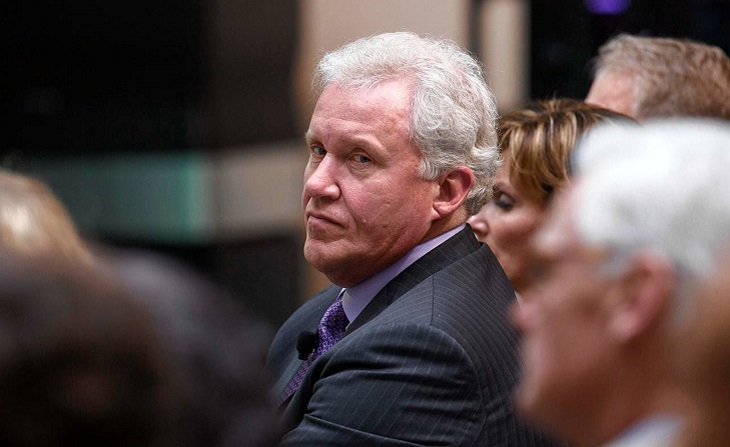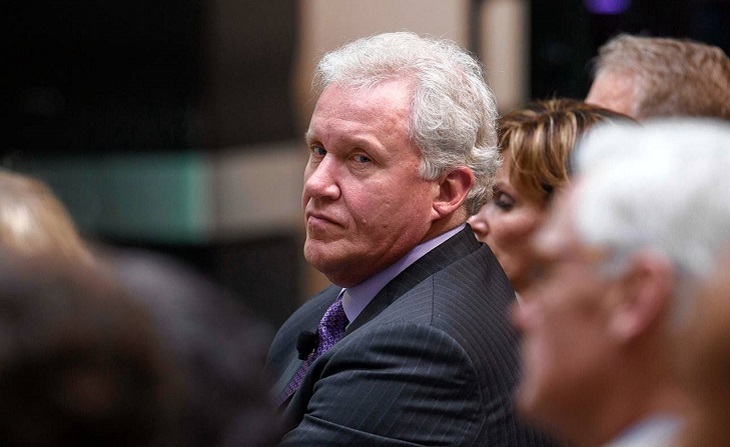The US Justice Department has rejected an antitrust settlement offer from Electrolux and General Electric for a pending US$3.3 billion deal and is preparing to take its concerns to trial on November 9, according to a Justice Department lawyer.
The department is challenging Electrolux’s planned acquisition of GE’s home appliance business, arguing that it would harm competition and hurt consumers.
GE Chief Executive Jeff Immelt
Justice Department lawyer Ethan Glass said the agency had considered a proposal offered by the companies and that their lawyers had spoken to people at the “highest levels” of the department’s antitrust division. But he added that officials deemed their proposal “well short.”
Glass was adamant regarding the status of the matter, “There are no more discussions,” he said at a court hearing in Washington, D.C on Fiday.
He added that the proposal GE and Electrolux made to the department involved a third company taking a “small amount of assets” to preserve a competitive environment. But he said the government deemed that insufficient.
A lawyer for Electrolux, John Majoras, confirmed to US District Judge Emmet Sullivan, who is overseeing the case, that the two sides were no longer discussing a settlement. After the hearing, Electrolux spokeswoman Eloise Hale said the companies believed their proposal addressed the Justice Department’s concerns.
“We strongly disagree with their assessment of the acquisition, and are confident in the merits of our case,” Hale said. “We believe this transaction will provide consumers with access to a greater choice of high-quality, innovative products at more competitive prices.” A GE spokesman referred a reporter to Immelt’s comments about the deal on a mid-October call to discuss the company’s third-quarter results.
GE argues that the competition for appliances, including the stoves and cooktops singled out by the Justice Department in its complaint, is more global than critics recognise. The proposed deal would reduce makers of those products in the US from three major players to two, but Electrolux and GE also point to strong overseas players, including South Korea’s Samsung Electronics and LG Electronics and China’s Haier Group.
What the analysts say
Analysts believe that delays in the sale could hamper efforts by GE Chief Executive Jeff Immelt to focus the conglomerate on high-value infrastructure businesses like power turbines and jet engines. GE sought to exit the business before the financial crisis but had to put the process on hold as credit markets dried up.
“This is not a complicated transaction,” Immelt said, “Appliances is a highly competitive industry with at least seven manufacturers and 21 brands.”
The Justice Department in July filed a 15-page legal complaint challenging the proposed deal on the grounds that it would likely lead to “less competition, higher prices and fewer options for millions of Americans who buy major cooking appliances each year.” The complaint focused on the possible effect on the sale of kitchen appliances like ranges and wall-mounted ovens to “contract channel” customers like home-building companies, property managers and hotels.
But the government said the acquisition would leave only two major suppliers that provide a full line of kitchen appliances, including several models for each appliance, with a distribution network sophisticated enough to meet the needs of big purchasers. GE, Electrolux and Whirlpool Corp. currently own more than 90% of that market, the Justice Department said in its complaint.
On Friday, lawyers also discussed which parts of the trial and its related documents would be closed to the public. The companies said that much of the trial would involve sensitive business information.
This case is expected to be quite large and present considerable logistical problems, Majoras said. Judge Sullivan said the trial could involve 2,000 exhibits.
In recent months, GE has sought to reassure investors about its plans to shed its appliance business, which generated most of the US$8.4 billion in sales from GE’s Appliance and Lighting division last year. GE reported total sales of roughly $148 billion in 2014.
The company has reiterated its position that the sale to Electrolux should clear antitrust review, including on its third-quarter earnings call. Failing that, GE has other options to unload the business, people familiar with the company’s thinking say. The company also stands to receive a $175 million breakup fee if the transaction, which was agreed upon in September 2014, isn’t completed as planned.
The decision to find a buyer for its venerable appliance business was a major break from GE’s past and a powerful symbol of Mr. Immelt’s commitment to overhauling the company’s portfolio. If completed, the sale of GE’s business making washers, dryers and stoves would almost entirely sever the link between GE and retail consumers.
The deal would also mean parting ways with GE’s massive Appliance Park complex in Louisville, Ky., an iconic industrial campus that exemplified the company’s growth in selling whitegoods to America’s middle class through much of the 20th century.
But Immelt said GE’s future will focus on its higher-tech heavy industrial products including power turbines, jet engines and health-care equipment. He says the company will also launch forays into areas like managing the streams of digital information that now flow from such devices, allowing new opportunities to manage and troubleshoot industrial machines.
The company is also selling off its once-massive financial services business, a unit that has its origins in offering credit to GE customers during the Great Depression.


